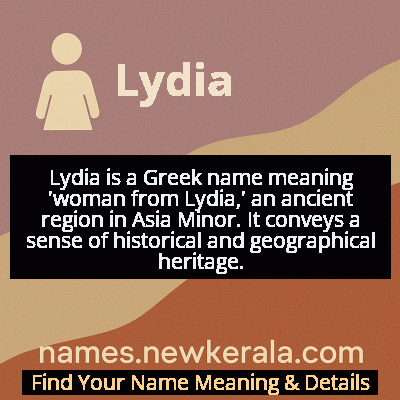Lydia Name Meaning & Details
Origin, Popularity, Numerology Analysis & Name Meaning of Lydia
Discover the origin, meaning, and cultural significance of the name LYDIA. Delve into its historical roots and explore the lasting impact it has had on communities and traditions.
Name
Lydia
Gender
Female
Origin
Greek
Lucky Number
6
Meaning of the Name - Lydia
Lydia is a Greek name meaning 'woman from Lydia,' an ancient region in Asia Minor. It conveys a sense of historical and geographical heritage.
Lydia - Complete Numerology Analysis
Your Numerology Number
Based on Pythagorean Numerology System
Ruling Planet
Venus
Positive Nature
Harmonious, responsible, caring, and artistic.
Negative Traits
Overly idealistic, superficial, possessive, or jealous.
Lucky Colours
Pink, turquoise.
Lucky Days
Friday.
Lucky Stones
Diamond, turquoise.
Harmony Numbers
2, 3, 9.
Best Suited Professions
Artists, musicians, teachers, healthcare workers.
What People Like About You
Warmth, nurturing nature, artistic flair.
Famous People Named Lydia
Lydia Maria Child
Abolitionist, women's rights activist
Pioneering American abolitionist and author of influential anti-slavery literature
Lydia Ko
Professional Golfer
Youngest player ever to achieve world number one ranking in professional golf
Lydia Davis
Author, Translator
Award-winning short story writer and recipient of MacArthur Genius Grant
Lydia Lunch
Musician, Performance Artist
Influential figure in the no wave music scene and provocative spoken word artist
Name Variations & International Equivalents
Click on blue names to explore their detailed meanings. Gray names with will be available soon.
Cultural & Historical Significance
In the Christian tradition, Lydia of Thyatira appears in the Acts of the Apostles as the first documented European convert to Christianity. Described as a 'dealer in purple cloth'—an expensive commodity in antiquity—she represents early female leadership in the church and successful entrepreneurship. This biblical account significantly influenced the name's spread throughout Europe during the Christian era. The name maintained popularity among aristocratic and educated families during the Renaissance and Enlightenment periods, appreciated for its classical roots and elegant phonetics. In literature, Jane Austen's Lydia Bennet in 'Pride and Prejudice' added another layer to the name's cultural footprint, representing youthful exuberance and romantic impulsiveness.
Extended Personality Analysis
Women named Lydia are typically associated with a distinctive blend of intelligence, creativity, and practical wisdom. The name suggests someone who is culturally sophisticated yet grounded, often displaying excellent taste in arts and literature. Many Lydias possess natural elegance and social grace that makes them effective communicators and charismatic presence in various settings. Their historical connection to commerce and the biblical Lydia's business success often translates into modern organizational skills and financial acumen.
Psychologically, the name implies depth of character and emotional intelligence. Lydias are frequently perceived as loyal, dependable friends who value meaningful relationships. They tend to be independent thinkers who balance traditional values with progressive ideas, making them adaptable to changing circumstances while maintaining core principles. The name carries suggestions of resilience and inner strength—qualities that enable Lydias to navigate challenges with poise and determination. Their creative tendencies often manifest in artistic pursuits, problem-solving innovation, or unique approaches to conventional situations, making them valuable contributors in both professional and personal contexts.
Modern Usage & Popularity
Lydia has experienced a significant revival in the 21st century, transitioning from a somewhat old-fashioned name to a contemporary classic choice. In the United States, it has steadily climbed popularity charts since the 1990s, consistently ranking within the top 150 girls' names and frequently breaking into the top 100. This resurgence reflects broader naming trends favoring vintage names with literary and historical connections. The name enjoys particular popularity among college-educated parents in urban areas who appreciate its sophistication and cross-cultural versatility. Lydia's appeal spans multiple demographics—it's traditional enough for conservative families yet distinctive enough for those seeking unique names. Its strong performance in countries like England, Australia, and Canada demonstrates its international appeal. The name's popularity is bolstered by positive cultural associations, including strong female characters in media and the trend toward names ending in 'ia' sounds. Current data suggests Lydia will maintain its popularity as it strikes the perfect balance between familiarity and distinctiveness.
Symbolic & Spiritual Meanings
Symbolically, Lydia represents a fascinating convergence of historical wealth, spiritual significance, and cultural refinement. The name's origin in the wealthy Lydian kingdom imbues it with metaphors of prosperity, commercial success, and valuable resources—both material and intellectual. Purple, the color associated with the biblical Lydia's trade, adds layers of symbolism including royalty, wisdom, creativity, and spiritual enlightenment. Metaphorically, Lydia serves as a bridge between civilizations—connecting ancient Anatolia with classical Greece and Rome, and later with Christian Europe.
The name embodies the concept of transformation and new beginnings through its association with religious conversion in the biblical narrative. It suggests someone who can navigate different worlds and adapt to changing circumstances while maintaining core identity. In psychological terms, Lydia symbolizes integrated femininity—combining strength with grace, intelligence with intuition, tradition with innovation. The name carries echoes of merchant princesses and pioneering businesswomen, representing female empowerment through economic independence and intellectual achievement. Its enduring popularity across centuries makes it symbolic of timeless elegance and the preservation of cultural heritage in modern contexts.

